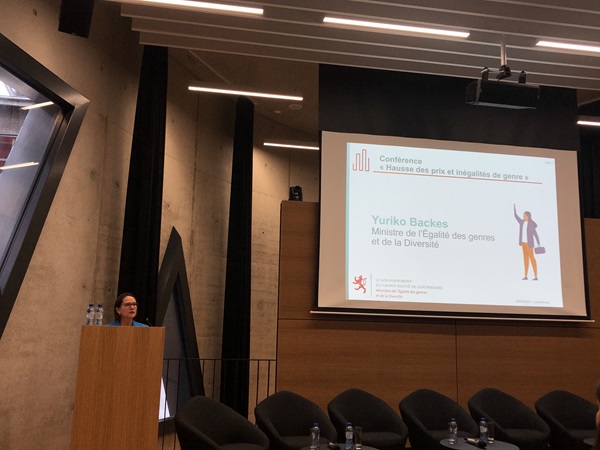 Luxembourg’s Minister for Gender Equality and Diversity, Yuriko Backes;
Credit: Otilia Dragan/Chronicle.lu
Luxembourg’s Minister for Gender Equality and Diversity, Yuriko Backes;
Credit: Otilia Dragan/Chronicle.lu
On the morning of Friday 29 March 2024, Luxembourg’s Institute of Socio-Economic Research (LISER) and Luxembourg’s Ministry for Gender Equality and Diversity held a conference presenting the results of a new study on the rising prices and gender inequality in Luxembourg at the Maison du Livre in Esch-Belval.
Luxembourg’s Minister for Gender Equality and Diversity, Yuriko Backes, held a keynote speech emphasising the need to have hard facts to be able to effectively contribute to better policymaking. She highlighted four main areas concerning inflation and gender equality, namely the impact of the current crises on the population (especially on women), the fact that the most vulnerable are most often heavily impacted, the importance of diversity in decision-making bodies and the strive for a more resilient society. She particularly stressed the need to implement the fifth global goal, gender equality, one which, according to the World Economic Forum and the UN, could take from 130 to 300 years to be achieved. She noted the pivotal role of gender equality “on a global level and down to the smallest municipality in Luxembourg” and how the Grand Duchy should strive to make gender equality an immediate priority.
Aline Muller, the CEO of LISER, next spoke about the importance of exploring the roots of inequality between men and women, and the need to understand the complex phenomena and voters’ opinions and perceptions of the various dimensions of the issues at hand.
The study analysed the implications of rising prices in Luxembourg, in particular their potential multiplier effect on gender inequalities. It focused particularly on the direct impact of inflation on living conditions, and also on the indirect effects on preferences and constraints likely to influence differently the abilities of women and men to consider eco-responsible consumption behaviours.The study also looked at whether women can be a driving force behind the ecological and social transition towards a less unequal and more sustainable model.
Housing emerged as a critical issue in Luxembourg, with soaring real estate costs and the formulation of support policies for vulnerable households taking centre stage in the Grand Duchy's concerns. Reports from the LISER housing observatory in 2021 and 2022 underscored the disproportionate impact of rising costs on low-income tenants, singles and especially single-parent families. In 2019, 37.6% of households in Luxembourg were headed by a woman. In terms of overall effort rate (measuring the weight of financial expenses against the total disposable income), there were few differences between women and men (23.6% against 24.8% respectively) with a national average of 24%. Renting households, whether headed by a man or a woman, display higher effort rates (more than 36% compared to around 30% for owners with a loan).
Moreover, single mothers contended with lower incomes than their male counterparts while grappling with comparable or slightly higher housing costs, which amplified the financial strain on these families. The strain was evident in their housing expenditures, with single women with children in rental accommodation allocating nearly half of their disposable income (49%) to cover housing costs.
While overall inflation did not seem to be significantly affected by gender, focusing on the rise in electricity and heating prices, LISER found that households headed by women were more severely impacted due to the priority given to expenditure on essential goods and needs.
The study also highlighted the fact that women, on average, adopt more eco-responsible consumption behaviours than men, while expressing greater support for policies linked to sustainable development. However, women also faced more obstacles to adopting sustainable behaviours than men, which, LISER suggested, shows the need to alleviate these barriers through targeted measures.
According to LISER, the study’s results highlighted the need to address the issue of housing, consumption behaviour and attitude towards the environment with a systemic approach, as the poorest households are most likely to be affected by various types of deprivation. This also manifested itself in an increase in gender inequalities in the poorest sections of the population. The definition and implementation of public policies targeted against gender inequalities require a global approach and inter-ministerial coordination, LISER added. These policies must, then, take into consideration the intersectional nature of economic vulnerabilities and the effects that privatisations have on the consumption preferences of individuals.








